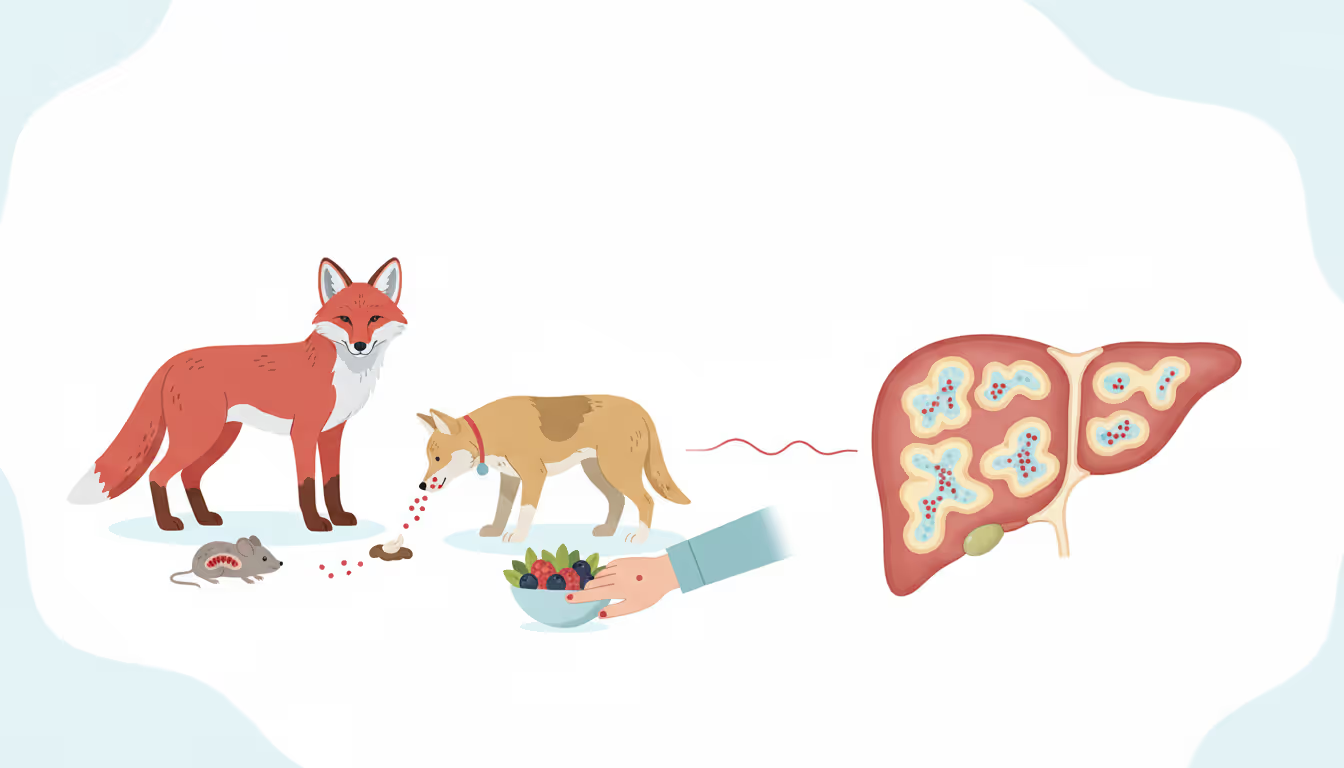
**Alveolar Hydatid Disease (AHD): An Overview**Alveolar hydatid disease, often abbreviated as AHD, is an illness triggered by the larval form of the tiny tapeworm Echinococcus multilocularis. This condition is prevalent globally, particularly in northern regions such as central Europe, Russia, China, Central Asia, Japan, and North America. Within North America, E. multilocularis is predominantly found in areas stretching from eastern Montana to central Ohio, as well as in Alaska and Canada. Human cases have been documented in locations like Alaska, Manitoba, and Minnesota.The prevalence of infection among wild foxes and coyotes can be high, exceeding 50% in certain regions. However, the transmission rate to humans remains low even in these areas. Wild foxes, coyotes, and sometimes cats contract the infection by consuming the larvae of Echinococcus multilocularis found in infected rodents, field mice, or voles. Although cats are less vulnerable than dogs, they may still become infected since they often hunt and eat rodents. Once an animal is infected, the tapeworm matures in its intestines, lays eggs, and the infected animal subsequently passes these eggs. These eggs are microscopic, directly infectious to other animals, and can adhere to anything they touch. Despite carrying the tapeworm, coyotes, foxes, dogs, and cats show no symptoms of AHD.Humans can accidentally ingest E. multilocularis tapeworm eggs, typically through two main pathways involving "hand-to-mouth" contamination:1. Directly consuming food contaminated with feces from foxes or coyotes, such as grass, herbs, greens, or berries collected from fields.2. Petting or handling domestic cats and dogs infected with the E. multilocularis tapeworm. These pets may shed the tapeworm eggs in their feces, potentially contaminating their fur. Some dogs may also become contaminated by rolling in material such as wild animal feces.For five decades, E. multilocularis was mostly confined to the Alaskan coast and Canada. However, the trapping and relocation of wild coyotes, foxes, and wolves to states previously unaffected by E. multilocularis have increased the risk of spreading the disease to both animals and humans. Wild animals carrying the tapeworm could establish a transmission cycle in new areas, exposing previously uninfected animals. Although many states restrict the movement of wild animals, the practice continues, raising the risk of human infection. While the likelihood of contracting AHD is low, certain groups face a higher risk.High-risk individuals include trappers, hunters, veterinarians, or anyone who comes into contact with wild foxes, coyotes, their feces, or domestic cats and dogs that may consume infected wild rodents. AHD is characterized by tumor-like or cyst-like tapeworm larvae developing in the body, primarily affecting the liver but potentially spreading to other organs. Due to their slow growth, these infections may remain asymptomatic for years. However, as the cysts grow, they can cause upper abdominal pain, weakness, and weight loss, with symptoms resembling liver cancer or liver failure.Diagnosis involves a blood test to detect the presence of the parasite or antibodies to E. multilocularis. Surgery is the primary treatment for AHD, although removing the parasite mass is rarely 100% successful. Post-surgery, medication may be required to prevent cyst regrowth.To prevent infection in areas where E. multilocularis is present in rodents and wild canines, consider these precautions:- Avoid touching foxes, coyotes, or other wild canines unless wearing gloves. Hunters and trappers should use plastic gloves to minimize exposure.- Do not keep wild animals, especially wild canines, as pets or encourage them to approach your home.- Prevent your cats and dogs from roaming freely or hunting rodents.- If you suspect your pet has eaten rodents, consult a veterinarian about potential preventive treatments.- Always wash your hands with soap and warm water after handling pets.- Use fences to keep wild animals out of gardens.- Refrain from collecting or eating wild fruits or vegetables directly from the ground. Ensure all wild-picked foods are thoroughly washed or cooked before consumption.




